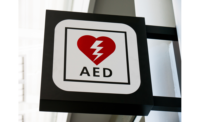National CPR and AED Awareness Week is June 1-7, and the American Red Cross encourages people to get trained in CPR and how to use an automated external defibrillator (AED). Jenifer Fox, a recent University of Washington (UW) graduate, knows first-hand how CPR can save a life.
Two years ago, Fox witnessed the death of a good friend who had an epileptic seizure in her sorority house. CPR wasn’t able to save her friend’s life, but the event made Jenifer think about how unprepared young adults were for unexpected medical emergencies. Fox reached out to the American Red Cross to start a CPR club at UW, so she could educate herself and her peers. To date, her club has helped train more than 300 people in life-saving CPR. “If one life could be saved, it would all be worth it,” Fox said.
“The majority of cardiac arrests happen in the home or workplace so it is likely you could be helping someone you know,” said Sonia Nurske, instructional programs manager for the local Red Cross. “Now is a great time to take a class, so you can be ready to respond. The Red Cross recently updated its curriculum with the latest life-saving techniques.”
The Red Cross First Aid, CPR and AED program is designed to help lay responders such as parents, teachers, daycare providers and employees recognize and respond to cardiac, breathing and first aid emergencies. Participants learn how to give immediate care to a suddenly injured or ill person until more advanced medical personnel arrive and take over.
The American Red Cross is a non-profit, humanitarian organization dedicated to helping make families and communities safer at home and around the world. Last year, the local Red Cross trained more than 70,000 in first aid, CPR and other safety classes. For more information, visit www.redcross.org.
Source: American Red Cross





